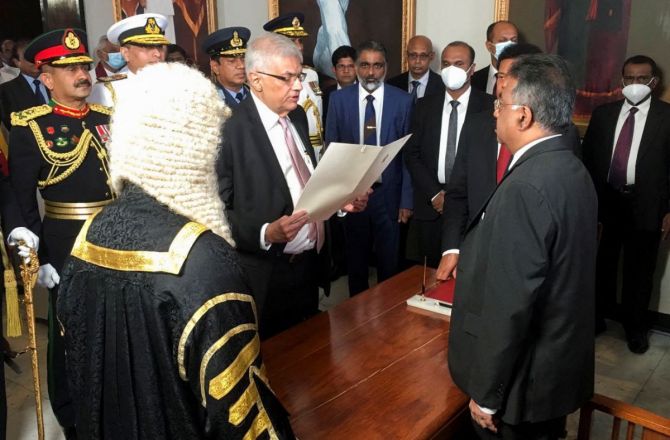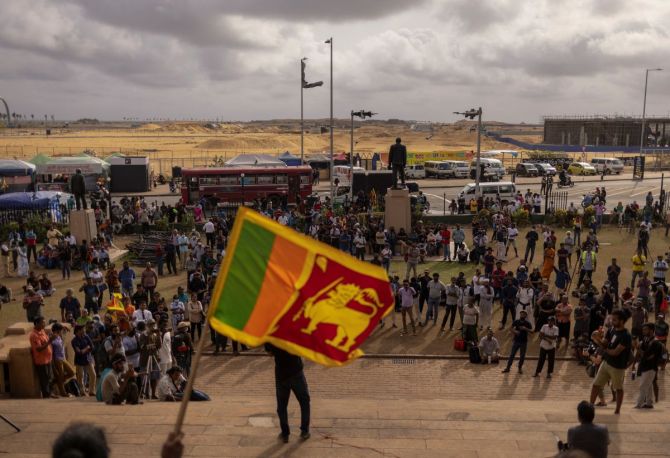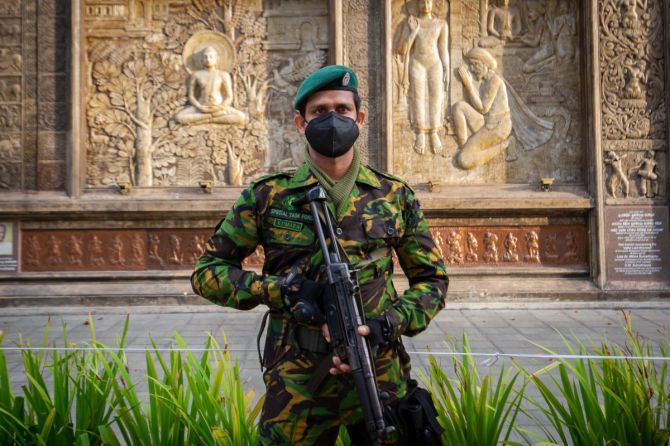'While parliament has elected him, the people are demanding that he goes home.'

"Now that he is the president, it is to be seen whether he can actually deliver on his ambitious promises and there is tangible change for Sri Lankans," says constitutional lawyer and activist Bhavani Fonseka.
"But if there isn't, these protests will continue to grow and anger will continue to fester in Sri Lanka," she tells Rediff.com's Archana Masih in a phone conversation from Colombo after Ranil Wickremesinghe's election as president.
Ranil Wickremesinghe has the mandate of parliament, but not of the people who demanded his resignation as prime minister. What impact is his election going to have on the crisis in Sri Lanka?
Ranil Wickremesinghe is the eighth president of Sri Lanka. He is taking office in an unprecedented political and economic crisis.
He has a huge task ahead in terms of the multiple areas that require urgent attention.
He also comes in at a time where there are ongoing protests in the country.
He has a massive task ahead, but still doesn't enjoy the trust of the people. While parliament has elected him, the people are demanding that he goes home.
His legitimacy is questioned; he is not seen as a credible leader by the people.
After his election was announced, the protesters had a press conference and said they don't accept his election.
We're not going to see the end of the protests, if anything, his appointment may have galvanised more people to continue the struggle because Wickremesinghe is seen as very close to the Rajapaksas.
Will there be a harsher crackdown on protestors?
We are in a state of emergency declared by Wickremesinghe. It is to be seen if the state of emergency is going to be extended next week and whether it leads to repression and abuse of power.
It is early days, but there are worries because Sri Lanka has a history of emergency where serious violations have occurred.
A draconian law is in force while the protesters continue to protest. We don't know whether it would lead to violence or intimidation and the situation has to be watched very closely.

Do you think him capable enough of steering the country in the next few months and in terms of getting the funds that are needed for Sri Lanka?
He has the unenviable task of ensuring there is political stability to address the economic crisis. He has been prime minister for two months and knows the gravity of the situation. One hopes that he is aware of what needs to be done urgently and does not waste time.
Wickremesinghe is a very experienced politician and has held the finance minister's post in the past. He took over as PM in May saying there will be a donor conference and assistance will come in which hasn't really happened in the last two months.
This has contributed to the frustration of the protesters who feel that promises haven't led to change on the ground.
Now that he is the president, it is to be seen whether he can actually deliver on his ambitious promises and there is tangible change for Sri Lankans. But if there isn't, these protests will continue to grow and anger will continue to fester in Sri Lanka.
The Rajapaksas voted in parliament and Wickremesinghe's election shows that they continue to wield influence. Do you think they will continue to be very much around even though they have been ousted from power?
I don't think they are going anywhere. They are very much here to stay and will be a considerable influence in Sri Lanka into the future.

What do you see as the future of the protests? Are the numbers dwindling and is it losing steam?
The core protesters will continue, but there's already some fatigue among the protesters. It's been several months, despite the hardships and oil crisis, thousands travelled to the protest sites on July 9.
It showed that people are still willing to come out, demanding for change. The deepening economic crisis coupled with fatigue among people may have an impact. But I think the protests won't stop because people also have felt an impact of the protests.
They want to see change in Sri Lanka. They want to see a change in the political culture.
Were you expecting Ranil Wickremesinghe to be elected president?
Ranil Wickremasinghe stands for the same political positions and views of the Rajapaksas. I was hoping that it wouldn't be him, but the members of parliament have decided otherwise. He has been elected through the constitutional process and we have to see whether he's able to do the job and deliver.
I would have liked to see an option where there's a change in terms of the governance model and the candidate could bring a coalition government.
The other two candidates could have done that, but unfortunately, neither one got sufficient votes.
At this moment, Sri Lanka needs a government and a political leader who has the trust of the people.
Feature Presentation: Aslam Hunani/Rediff.com











 © 2025
© 2025